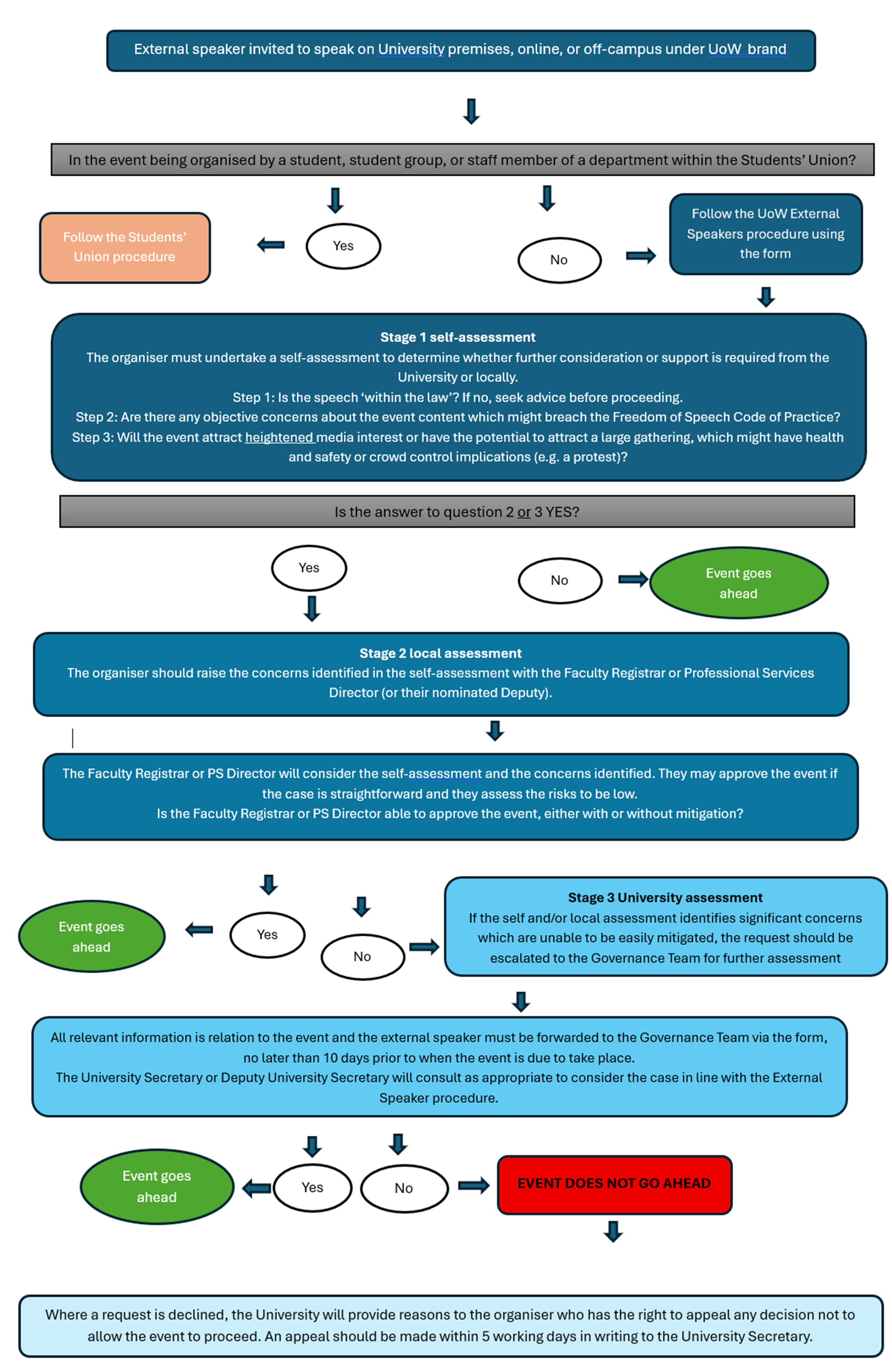
What is the initial step?
A Stage 1: Self-assessment must be completed as the initial step in the process of requesting external speakers.
It’s important to note that not all cases will require a Stage 2 assessment: Local assessment. The Local Assessment is only where the self-assessment indicates medium or high risk factors.
Events organised by Students or Student Union:
For events being organised by a student, student group, or staff member of a department within the Students’ Union, please follow the Students’ Union External Speaker Procedure. An external speaker or venue booking should not be confirmed until it has been approved by either the University of Wolverhampton or the Students’ Union. It is therefore important that the process is started at the earliest opportunity.
External Speaker Request
University of Wolverhampton External Speaker procedure.
When you complete Stage One of the external speaker form Stage 1 - Self Assessment
You’ll be asked three key questions. Use the guidance below to answer accurately and refer to our dedicated webpage around Freedom of Speech to better equip your understanding of key definitions. If you have any questions or queries, concerns or need for re assurance, please email freedomofspeech@wlv.ac.uk
After you have completed some details about the event and the speaker the three key questions are:
-
Is the intended speech within the law?
- Yes = The speaker/event does not involve unlawful speech. Remember:
- Lawful includes controversial or offensive views.
- Unlawful includes harassment, threats, incitement to violence, incitement to hatred, defamation, terrorism/proscribed groups.
- No = If you believe the speech is unlawful, the form will automatically escalate to the University Secretary (or a colleague with delegated responsibility).
- You’ll receive an auto-response confirming escalation.
- The University Secretary/delegated colleague will review, and you do not need to continue completing Stage One.
-
Are there any concerns about the event which might breach the University’s Freedom of Speech Code of Practice?
- Examples of potential breaches:
- Speaker not willing to engage in respectful debate.
- Risk that lawful but extremist views may intimidate or silence others.
- Event format not in line with the University Code of Practice (e.g. no chairing, no opportunity for challenge).
- If you answer Yes, you’ll be guided to Stage Two with your faculty registrar or professional services director.
- If no, continue.
-
Will the event attract heightened media interest or a large gathering (e.g. protest) that could raise health, safety, or crowd control issues?
- Consider:
- Is the speaker or topic likely to draw significant press coverage?
- Is there potential for counter-protests or crowding?
- If you answer Yes, you’ll be guided to Stage Two.
- If no, complete the form.
What happens next?
- No to Q1 → Auto-escalation to University Secretary/delegated colleague.
- Yes, to Q1, No to Q2 & Q3 → Event approved automatically, copy of approval generated, unique reference number assigned.
- Yes, to Q1, Yes to Q2 or Q3 → Trigger for Stage Two assessment with faculty registrar/professional services director.
Oversight and Records
- All submissions are stored securely under the University Secretary’s oversight.
- Provides clear audit trail in case of OfS inquiry or external challenge.
Key message for staff:
- Don’t confuse “offensive” with “unlawful.”
- Use the Code of Practice and online resource page for examples.
- Escalation is built in: you don’t have to resolve every issue yourself.
Stage Two Local Assessments must be completed by a faculty registrar or Director of Service. This guidance sets out the steps of a Stage Two Local Assessment, the form can be found here: Stage 2- Local Assessment
The event organiser will conduct this in partnership with those colleagues.
A Stage Two Local Assessment will be triggered if at Stage One Self-Assessment responses are answered in this way:
- Yes, to Q1, Yes to Q2 or Q3 → Trigger for Stage Two assessment with faculty registrar/professional services director.
Principle: The guiding question when completing stage two is always:
“How can we ensure this event or speech goes ahead safely?”
Not: “How can we find reasons to stop it?”
Risks must be acknowledged, not ignored — the aim is to apply proportionate mitigations to enable events wherever possible.
Stage Two Assessments are broken down in to two parts.
Part 1: Speaker, Audience & Topic Triage
When completing the triage step, the form will guide you with prompts. Use the outcomes below:
- LOW RISK
- Topic is uncontroversial, no controversial speakers.
- ✅ Proceed to Event Risk Assessment.
- ACCEPTABLE RISK
- Topic is controversial, but no controversial speakers.
- Audience restricted to University of Wolverhampton staff/students only.
- ✅ Proceed to Event Risk Assessment.
- MODERATE RISK
- Topic is controversial, no controversial speakers.
- Event is open to the public.
- ⚠️ Escalates to Stage Three University Assessment.
- HIGH RISK
- Topic is controversial and one or more speakers are controversial.
- ⚠️ Escalates to Stage Three University Assessment.
Note: If you select Moderate or High Risk, you cannot proceed further in Stage Two.
The form will automatically escalate to the University Secretary (or delegated colleague).
You’ll receive a message with clear next steps, including not to liaise with the speaker until further review.
Part 2: Event Risk Assessment
If your part 1triage outcome is Low or Acceptable Risk:
- You must complete the Event Risk Assessment template (provided separately).
- Pre-populated with common external speaker risks and standard control measures.
- Add any additional risks specific to your event must be added and assessed.
- In the form, you’ll be asked: “Have you completed the event risk assessment? “You will need to select yes or no.
- No → Task closes, and you’ll receive a copy of the form for your records.
- Yes → Upload your completed risk assessment.
- Indicate within the form if any risks remain high or extreme even after controls are applied:
- No → Event approved. You’ll receive confirmation to share with the organiser.
- Yes → Escalates automatically to Stage Three.
What happens next?
- Low/Acceptable speaker and topic Risk + Event Risk Assessment completed, and if risks are not high or extreme → Approval issued.
- Speaker or topic risk is Moderate/High Risk OR Residual High/Extreme Risks for the event its self-→ Escalated to Stage Three University Assessment.
- Records are stored securely under University Secretary oversight and audit.
Key message for staff:
- The process is about enabling lawful speech with proportionate safeguards.
- The prompts are designed to support your judgment — you are not left to interpret alone.
- Escalation points are built in; you don’t carry the risk alone.
Stage Three (University Assessment)
- Only at this stage, if it is determined that an event or speaker cannot proceed, the University Secretary (or a delegated colleague) will write to the organiser with a formal refusal.
- This communication will set out the reasons and explain how an appeal or complaint can be made.
It is anticipated that in most cases, Stage Three assessment will result in the event being allowed to proceed — usually subject to reasonable conditions.
- These conditions will be clearly communicated to:
- The event organiser,
- The local assessment lead(s), and
- The speaker(s).
- However, conditions will always be assessed for reasonableness. The University is minded that conditions that are too costly, impractical, or disproportionate may be viewed by the Office for Students as obstructive and contrary to the duty to secure free speech.
Principle: The process is designed to enable events to go ahead safely and lawfully wherever possible, with proportionate safeguards — not to find reasons to stop them.
Summary
At all stages of the external speaker process, it is vital that we do not frame decisions short of automatic approval as refusals. Instead, they are treated as deferred decisions pending further review.
- Stage One & Two: Where concerns are identified, the outcome is a deferral to the next stage for further consideration. This ensures proportionate escalation and shared responsibility.
- Stage Three: Only at this stage, if it is determined that an event or speaker cannot proceed, the University Secretary (or a delegated colleague) will write to the organiser with a formal refusal.


/prod01/wlvacuk/media/departments/digital-content-and-communications/submitted-news-images/Smelting-knife.png)
/prod01/wlvacuk/media/departments/digital-content-and-communications/images-2024/250630-SciFest-1-group-photo-resized-800x450.png)
/prod01/wlvacuk/media/departments/digital-content-and-communications/submitted-news-images/Way-youth-zone-August.JPG)
/prod01/wlvacuk/media/departments/digital-content-and-communications/images-2024/Arthi-Arunasalam-teaser.jpg)
/prod01/wlvacuk/media/departments/digital-content-and-communications/submitted-news-images/Muslim-woman-playing-football.jpg)
/prod01/wlvacuk/media/departments/digital-content-and-communications/submitted-news-images/Business-School-800x450.jpg)
/prod01/wlvacuk/media/departments/digital-content-and-communications/submitted-news-images/University-of-the-Year.jpg)


